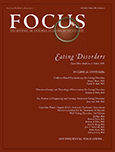Nothing Tastes as Good as Skinny Feels: the Neurobiology of Anorexia Nervosa
Abstract
Individuals with anorexia nervosa (AN) engage in relentless restrictive eating and often become severely emaciated. Because there are no proven treatments, AN has high rates of relapse, chronicity, and death. Those with AN tend to have childhood temperament and personality traits, such as anxiety, obsessions, and perfectionism, which may reflect neurobiological risk factors for developing AN. Restricted eating may be a means of reducing negative mood caused by skewed interactions between serotonin aversive or inhibitory and dopamine reward systems. Brain imaging studies suggest that altered eating is a consequence of dysregulated reward and/or awareness of homeostatic needs, perhaps related to enhanced executive ability to inhibit incentive motivational drives. An understanding of the neurobiology of this disorder is likely to be important for developing more effective treatments.
(Reprinted with permission from the Trends in Neurosciences 2013; 36:110–120)



